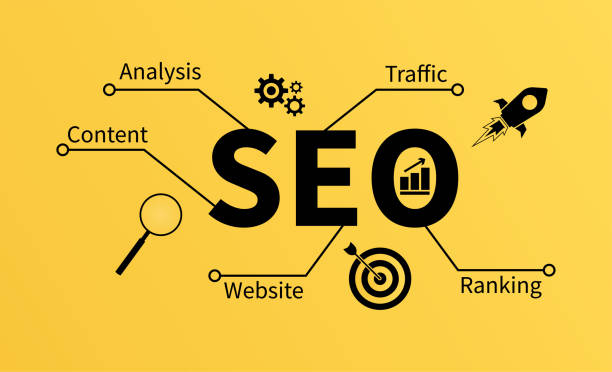Fundamentals of SEO and Its Importance for Businesses

In today’s highly competitive world, online presence is vital for every business, and #SEO is recognized as one of the most important tools to achieve this goal.
SEO, or Search Engine Optimization, is a process that prepares your website to achieve a better ranking in search engine results like Google, Bing, and Yahoo.
Imagine you have a physical store; SEO is like having your store on a main, busy street where potential customers can easily find you.
This process is not merely limited to increasing traffic, but rather means attracting targeted and high-quality traffic that increases their likelihood of conversion into customers.
The importance of SEO goes beyond a fleeting marketing tool; it is a long-term investment that guarantees the credibility and visibility of your brand.
Websites optimized for search engines not only attract more traffic but also have higher conversion rates, as users trust websites that rank high in search results more.
In fact, many users don’t even go beyond the first page of search results.
SEO includes a wide range of techniques such as keyword research, content optimization, link building, and technical SEO.
Each of these components plays a vital role in the success of an SEO strategy.
For example, a website might have excellent content, but if it’s not technically accessible to search engine crawlers, it will never be seen.
This comprehensive and multifaceted approach is what makes SEO a specialized and complex field.
Understanding the fundamentals of SEO is essential for every business owner, even if they plan to delegate the work to specialists.
This understanding helps you make the best decisions for your digital strategy and maximize your investment.
The ultimate goal of SEO is not just to improve ranking, but to create a better user experience and provide relevant and high-quality content to users.
Search engines increasingly emphasize the quality of user experience, and websites that provide valuable content and a user-friendly interface receive greater rewards.
This explanatory view of SEO shows how it can contribute to the sustainable and visible growth of businesses.
Did you know 85% of customers check your company’s website before any interaction?
With Rasaweb, build a corporate website worthy of your credibility.
✅ Increase credibility and customer trust
✅ Attract high-quality leads
⚡ Get free website design consultation
Types of SEO and Their Differences

SEO is a broad concept divided into different sections, each with its specific focus and techniques.
Understanding these differences is crucial for formulating a comprehensive and effective SEO strategy.
Generally, SEO can be divided into three main categories: On-Page SEO, Off-Page SEO, and Technical SEO.
Each of these SEO types targets different aspects of the website and its online environment and complements each other.
On-Page SEO refers to all actions you take within your website to improve its ranking in search engines.
This includes content optimization, keyword selection and placement, optimizing title tags, meta descriptions, URL structure, image optimization, and correct use of headings (H1-H6).
The main goal of On-Page SEO is to help search engines better understand the topic and relevance of the page’s content to user queries.
Engaging content that is well optimized can attract a lot of traffic.
Off-Page SEO refers to actions performed outside your website that affect its ranking.
The most important part of Off-Page SEO is link building (Backlinking); meaning receiving links from other websites.
These links act as “votes of confidence” from other websites and increase your domain’s credibility and authority in the eyes of search engines.
The more links you receive from reputable and relevant websites, the more authoritative search engines consider your website.
In addition to link building, social media activity, influencer marketing, and online mentions can also indirectly affect Off-Page SEO.
Technical SEO deals with optimizing the technical aspects of a website to help search engine crawlers better crawl and index your pages.
This includes factors such as site loading speed, mobile-friendliness, site architecture, XML sitemaps, robots.txt file, and website security (HTTPS).
A technically optimized website provides a better user experience and helps search engines find and rank your content more effectively.
A specialized approach to technical SEO can yield significant results.
All these sections together form a comprehensive SEO strategy that is essential for achieving the best results.
Neglecting any of these areas can lead to a reduction in overall SEO effectiveness.
Keyword Research: The Backbone of Successful SEO

Keyword research, without exaggeration, is the backbone of any successful SEO strategy.
Without a proper understanding of the words your target audience uses to find your products or services, all your SEO efforts might be fruitless.
This process goes beyond merely finding a few relevant words; it involves deep analysis of user search intent, search volume, competition level, and the relevance of keywords to your content.
The goal is to identify high-potential keywords that not only drive significant traffic to your website but also attract traffic with a high likelihood of conversion into customers.
The keyword research process begins with brainstorming and initial idea generation.
At this stage, you think about what words your customers enter into the search engine.
Then, using specialized keyword research tools (such as Google Keyword Planner, Ahrefs, Semrush, and Moz Keyword Explorer), you expand these ideas and collect relevant data.
These tools help you discover long-tail keywords, which usually have less competition and indicate a more specific search intent.
For example, instead of “SEO,” the phrase “free SEO training for beginners” is a long-tail keyword that has a more specific intent and can drive more targeted traffic to a tutorial article.
After data collection, the analysis phase begins.
At this stage, you categorize keywords based on search volume, Keyword Difficulty, topic relevance, and user intent.
User Intent is of high importance; is the user looking for information (informative), intending to buy (transactional), looking for a specific website (navigational), or wanting to compare something (commercial investigation)? Answering these questions helps you optimize your content to precisely meet user needs.
A good guide here is to understand that SEO is not just limited to keywords but also involves a deep understanding of user behavior and how they interact with information.
Selected keywords should be naturally integrated into the content to be understandable for search engines and readable for users.
This is a specialized process that requires precision and analytical insight.
| Keyword Type | Explanation | Search Intent | Example |
|---|---|---|---|
| Short-tail (Short Keywords) | Usually one to two words, high search volume, intense competition. | Broad, often vague intent. | “Shoe” |
| Mid-tail (Medium Keywords) | Two to three words, medium search volume, medium competition. | Slightly more specific, a mix of informational and commercial. | “Men’s sports shoe” |
| Long-tail (Long Keywords) | More than three words, lower search volume, less competition. | Very specific and niche, clear intent (purchase, information). | “Buy Nike Air Force sports shoe size 42” |
Content Optimization for Search Engines

Content is king, and this statement holds true in the world of SEO more than ever.
Simply having content is not enough; you must produce content that is both engaging for users and understandable and rankable for search engines.
Content Optimization is a process that includes writing, structuring, and enhancing content in a way that performs best in search results.
This part of SEO, alongside keyword research, forms the foundation of a successful content marketing strategy.
The first step in content optimization is producing high-quality and valuable content.
Your content should address the needs of your target audience, answer their questions, and provide accurate and comprehensive information.
Educational content, explanatory content, or even analytical content can fall into this category.
Content quality not only affects your ranking in search engines but also impacts your brand’s credibility and user engagement with your website.
Search engines are increasingly relying on sophisticated algorithms that can understand the quality and depth of content.
After content production, it’s time to optimize it for SEO.
This includes naturally placing target keywords within the text, using synonyms and related words (LSI keywords), optimizing the page title (Title Tag) and meta description with keywords, and structuring content using appropriate headings (H1, H2, H3, etc.).
Using headings helps search engines understand the structure and main topics of your content and also improves text readability for users.
Internal linking is also highly important; that is, linking from one page to another within your own website, which helps search engines crawl and index your pages better and also improves the user experience.
Optimizing images with appropriate Alt tags, reducing image file sizes to improve page loading speed, and using descriptive, keyword-rich URLs are also other important aspects of content optimization.
A website with well-optimized and structured content can achieve high SEO rankings.
This approach means producing content that is both entertaining and informative, keeping users on your site for longer.
Content SEO is not just about words, but about creating a complete and valuable experience for visitors.
This is a continuous process that requires regular monitoring and updating to keep pace with changes in search engine algorithms and user needs.
Tired of your company’s website not being seen as it should and losing potential customers? With professional and effective website design by Rasaweb, solve this problem forever!
✅ Increase brand credibility and earn customer trust
✅ Attract targeted sales leads
⚡ Contact us now for a free consultation!
The Importance of Link Building in SEO Strategy
![]()
Link Building is one of the fundamental and crucial pillars in Off-Page SEO strategy that plays an important role in determining a website’s credibility and authority in the eyes of search engines.
Google and other search engines consider incoming links (backlinks) from other websites as “votes of confidence” or “references.”
The more high-quality and relevant links your website receives from reputable sites, your Domain Authority and Page Authority increase, which in turn leads to improved rankings in search results.
But not all links are created equal.
Link quality matters more than quantity.
A link from a highly reputable and relevant website is worth far more than dozens of links from low-quality or irrelevant websites.
Search engines, especially Google, use sophisticated algorithms like the Penguin algorithm to identify and penalize spammy and low-quality links.
Therefore, a link-building strategy should focus on acquiring natural, authoritative, and relevant links.
This is a specialized and time-consuming process that requires patience and continuous effort.
There are various methods for link building.
Producing valuable and shareable content (Content Marketing) is one of the most effective methods.
If your content is good enough that others want to refer to it and share it, links will naturally flow to you.
This type of educational or analytical content can be very useful.
Other methods include:
- Broken Link Building: Finding broken links on other websites and suggesting your content as a replacement.
- Directories and Local Listings: Registering your website in reputable and local directories.
- Digital PR: Collaborating with media and news websites to publish content or news related to your business.
- Competitor Link Building: Analyzing competitor link profiles and identifying new opportunities.
Link building should not be done solely for SEO, but should be part of a comprehensive strategy to increase brand awareness and build relationships with other websites and influencers.
Successful SEO in the long run requires a healthy and diverse link profile.
This is a key guide for anyone who wants to succeed in SEO.
SEO, as a dynamic ecosystem, requires a smart approach to link building that helps your credibility and position on the web.
Technical SEO: Hidden but Crucial Elements

Technical SEO is often described as the hidden infrastructure of a successful website in search engines.
This part of SEO addresses the technical aspects of a website that directly affect its crawlability and indexability by search engines.
Even the best content and strongest link profile will not perform well in search results if the website has technical issues.
This area of SEO requires specialized knowledge and high precision.
One of the most important aspects of technical SEO is Page Speed.
Today’s users expect websites to load in less than a few seconds, and search engines also consider speed as an important ranking factor.
Optimizing images, compressing files (CSS, JavaScript), using caching, and choosing a suitable hosting provider all help improve site speed.
Another factor is Mobile-Friendliness.
With the increasing use of mobile devices for searching, Google uses the “Mobile-First Indexing” algorithm, meaning it prioritizes the mobile version of your website for indexing and ranking.
Therefore, having a responsive design that displays your website well on all devices is crucial.
Site Architecture is also of high importance.
A logical and hierarchical structure helps search engines easily find different pages of your website and understand the relationships between them.
Using an XML Sitemap and a robots.txt file is also very useful in this regard.
The sitemap provides search engines with a list of all important pages on your website, and robots.txt tells them which sections not to crawl.
Website security (HTTPS) is also an important ranking factor.
Having an SSL certificate and using the HTTPS protocol not only secures your website and gains user trust but is also considered a positive signal by Google.
Controlling Crawl Errors, managing redirects, and correctly using canonical tags are also other aspects of technical SEO that can directly impact your website’s visibility in SEO results.
These aspects might be hidden from ordinary users, but they are crucial for a website’s success in the competitive world of search engines and require a precise analytical approach.
The Role of User Experience in SEO Ranking

User Experience (UX) is no longer just a “bonus,” but has become a critical factor in SEO ranking.
Search engines are increasingly focusing on user experience signals to determine the quality and relevance of a website.
A website with excellent UX not only keeps users satisfied but also indirectly helps with site SEO.
This is a comprehensive approach that shows SEO is no longer just about keywords and links, but about creating a seamless and enjoyable experience for visitors.
Google, by introducing Core Web Vitals (main web metrics) which include three main criteria, has clearly shown how important user experience is to it:
- Largest Contentful Paint (LCP): The time it takes for the largest content element on the page (image or text) to load.
Fast loading speed results in a better user experience. - First Input Delay (FID): The time it takes from the user’s first interaction with the page (e.g., clicking a button) until the browser responds to it.
This metric measures page responsiveness. - Cumulative Layout Shift (CLS): The amount of unexpected layout shifts on the page.
Sudden displacement of page elements can disrupt the user experience.
In addition to Core Web Vitals, other factors also influence UX that indirectly affect SEO.
A low Bounce Rate indicates that users found your content useful and stayed on the site.
High Dwell Time also sends a positive signal to search engines that your content is engaging and relevant.
Attractive visual design, easy (Intuitive Navigation), effective internal search capability, and clear Call to Actions all contribute to improving the user experience.
Engaging and accessible content also plays a significant role in UX.
Even news content should be presented in a way that users can easily read and interact with it.
Finally, the Usability and Accessibility of your website for all users, including those with disabilities, demonstrates your commitment to an inclusive user experience.
SEO is now far beyond optimizing for robots; it means optimizing for humans, which leads to better SEO rankings.
| UX Factor | Explanation | Impact on SEO |
|---|---|---|
| Page loading speed | Time required to fully display page content. | Direct ranking factor, reduced bounce rate. |
| Mobile compatibility | Correct and responsive display of the website on mobile devices. | Direct ranking factor (Mobile-First Indexing). |
| Navigation | Ease of finding information and moving around the site. | Increased dwell time, reduced bounce rate, improved crawling. |
| Content quality | Being valuable, relevant, and comprehensive. | Increased Click-Through Rate (CTR), more sharing, positive user signals. |
| Call to Action (CTA) | Clear calls to action for users. | Increased conversion rate, improved user engagement. |
Measuring and Analyzing SEO Results

Implementing an SEO strategy without continuous measurement and analysis of results is like shooting an arrow in the dark.
To ensure that your efforts yield results and your investment pays off, you must regularly monitor and analyze your website’s SEO performance.
This process helps you identify your strengths and weaknesses, optimize your strategy, and outperform your competitors.
A strong analytical approach is the key to sustainable success in SEO.
Numerous tools are available for measuring and analyzing SEO results, each with its specific capabilities.
Google Search Console (GSC) and Google Analytics (GA) are two free and very powerful tools that every website should use.
GSC provides you with information on how your website appears in search results, the keywords users use to find you, crawl errors, and indexing issues.
GA also displays data related to website traffic, user behavior, conversion rates, and traffic sources.
Important metrics you should pay attention to in SEO analysis include:
- Organic Traffic: The number of visitors who come to your website through search engines.
- Keyword Rankings: Your website’s position for specific keywords in search results.
- Click-Through Rate (CTR): The percentage of users who click on your website after seeing it in search results.
- Bounce Rate: The percentage of users who leave a page after visiting it without interacting with other pages on the site.
- Dwell Time: The amount of time users spend on a page of your website.
- Number and Quality of Backlinks: Monitoring the link profile and identifying new links.
Regular analysis of these metrics allows you to see which parts of your SEO strategy are effective and which need improvement.
For example, if your ranking for a specific keyword has improved but the CTR is low, you might need to optimize your title and meta descriptions to make them more appealing.
Or, if the bounce rate is high, perhaps your content is not relevant or engaging enough.
A news report on SEO status can help you in future decision-making.
This continuous monitoring and adjustment demonstrate the dynamic nature of SEO and help businesses remain competitive in the ever-changing world of search engines.
SEO is a relentless path of improvement and adaptation.
Does your current corporate website present a worthy image of your brand and attract new customers?
If not, turn this challenge into an opportunity with Rasaweb’s professional corporate website design services.
✅ Significantly improves your brand’s credibility and image.
✅ Paves the way for attracting new leads and customers for you.
⚡ Contact Rasaweb now for a free and expert consultation!
The Future of SEO: AI and New Trends

The world of SEO is never static and is constantly evolving.
What was effective yesterday might not be effective today, and what is cutting-edge today might become obsolete tomorrow.
With rapid advancements in technology, especially in Artificial Intelligence (AI) and Machine Learning, the future of SEO will also undergo significant changes.
Understanding these trends is essential for every SEO specialist and business owner to prepare their strategies for the future.
One of the most important future trends in SEO is the impact of Artificial Intelligence on search algorithms.
Google, with algorithms like RankBrain, BERT, and MUM, is increasingly using AI to better understand user search intent and provide more relevant results.
This means that SEO is no longer just about keyword matching, but about a deep understanding of natural language, answering complex questions, and providing comprehensive and authoritative content.
Engaging content that effectively answers potential user questions gains more value.
Voice Search and Visual Search are also growing trends that impact SEO.
With the increasing use of voice assistants like Siri, Alexa, and Google Assistant, optimizing for voice search is gaining increasing importance.
These types of searches are typically longer and closer to natural language (e.g., “Where is the nearest Italian restaurant?” instead of “Italian restaurant”).
Optimizing images and using Structured Data for visual search will also be crucial.
E-A-T (Expertise, Authoritativeness, Trustworthiness), which stands for expertise, authority, and trust, will remain an important factor in SEO and even gain more significance.
Google looks for websites that provide authoritative content, produced by experts, and are trustworthy.
This is especially crucial for YMYL (Your Money Your Life) topics such as health and finance, which have a direct impact on users’ lives.
Other trends include Local SEO, which is important for physical businesses, and Video SEO, given the increasing popularity of video content.
Optimizing for Snippets (featured content in search results) and direct Google answers will also be very important for attracting quick traffic.
The future of SEO requires an educational and analytical approach that constantly adapts to changes.
SEO is a dynamic game in which you must always be one step ahead to succeed.
SEO Beyond Ranking: Building Online Credibility

While the primary and initial goal of SEO has always been to achieve higher rankings in search engines, a deeper look reveals that true and sustainable SEO goes beyond merely reaching the top of search results.
In the long run, SEO means building online credibility, increasing brand awareness, and fostering trust among the audience.
A high ranking without credibility is like a baseless building that collapses with every tremor.
This is a comprehensive approach and a guide to sustainable success.
Building Authority and Trust in the eyes of search engines and users not only helps the stability of your rankings but also makes your website a reliable source in its field.
This credibility is gained through a combination of factors: producing specialized and high-quality content, acquiring natural backlinks from reputable websites, providing an excellent user experience, and having an active and constructive presence on social media.
A website that consistently provides educational, analytical, or news content gradually becomes a reference in its industry.
SEO also helps you connect with your target audience and address their needs.
When your content answers users’ questions and provides solutions to their problems, they not only return to your website but also recommend it to others.
This Word-of-Mouth Marketing is strengthened through SEO and helps your brand’s organic growth.
Engaging content can also help attract users and build an emotional connection with your brand.
Finally, SEO helps you expand your online presence and discover new opportunities.
By analyzing SEO data and conducting keyword research, you can identify market gaps and provide content and services that no one else offers.
This means innovating and being a leader in your industry.
SEO is not just a tool for attracting traffic; it is a comprehensive strategy for building a successful and sustainable online business that creates real value in the long term.
Remember that SEO is a marathon, not a sprint; its results may take time, but its rewards are sustainable and significant.
Frequently Asked Questions
| Question | Answer |
|---|---|
| What is SEO? | SEO, or Search Engine Optimization, is the process of increasing the quality and quantity of website traffic by improving the site’s ranking in organic search engine results like Google. |
| What are the main types of SEO? | SEO is divided into three main categories: On-Page SEO, Off-Page SEO, and Technical SEO. |
| What does On-Page SEO include? | On-Page SEO includes optimizing elements within the website, such as keywords, Title Tags, Meta Descriptions, content, URL structure, images, and internal links. |
| What is Off-Page SEO? | Off-Page SEO refers to activities outside the website that help improve its ranking, such as Backlink Building, social media marketing, and Brand Mentions. |
| What is Technical SEO? | Technical SEO focuses on optimizing the technical aspects of a website to help it be better crawled and indexed by search engines. This includes site speed, mobile-friendliness, site structure, Sitemaps, and the Robots.txt file. |
| What role do Keywords play in SEO? | Keywords are phrases that users enter into search engines. Correct and targeted use of relevant keywords in content and site elements helps search engines understand the topic of your page and display it for relevant searches. |
| What is a Backlink and why is it important? | A backlink, or inbound link, is a link from one website to another. Backlinks act as a “vote of confidence” from other sites for search engines and play an important role in the credibility and ranking increase of a site, especially if they are from authoritative sites. |
| What impact does quality content have on SEO? | Quality, relevant, comprehensive, and unique content not only attracts and retains users but also signals to search engines that your page is valuable. This helps improve ranking, reduce Bounce Rate, and increase user dwell time on the site. |
| Why is site loading speed important for SEO? | Site loading speed is an important ranking factor for Google. Faster sites provide a better user experience, have lower bounce rates, and are preferred by search engines. |
| Is SEO a one-time process? | No, SEO is an ongoing and long-term process. Search engine algorithms are constantly changing, competition is increasing, and site content also needs updating. Therefore, SEO requires continuous monitoring, analysis, and optimization. |
And other services of Rasaweb Advertising Agency in the field of advertising
Smart Brand Identity: A creative platform to improve customer acquisition with intelligent data analysis.
Smart SEO: Revolutionize online growth with the help of Google Ads management.
Smart Website Development: A creative platform to improve sales growth with custom programming.
Smart Advertising Campaign: A dedicated service for growth in customer behavior analysis based on custom programming.
Smart Brand Identity: Professional optimization for customer behavior analysis using SEO-driven content strategy.
And over hundreds of other services in the field of online advertising, advertising consultation, and organizational solutions
Internet Advertising | Advertising Strategy | Advertorials
Sources
- Advanced SEO Training
- Website Optimization Techniques for Search Engines
- Comprehensive Guide to Ethical Link Building in SEO
- Content Marketing and SEO Strategy
? Ready to transform your business in the digital world? Rasaweb Afarin Digital Marketing Agency, specializing in SEO, online advertising, and custom website design, is your reliable partner on the path to growth. For a powerful online presence, contact us today!
📍 Tehran, Mirdamad Street, next to Bank Markazi, Southern Kazerun Alley, Ramin Alley No. 6




